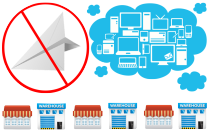Last December we wrote a blog post titled Accounting Software Outlook for 2012, and with 2013 just around the corner we thought it would be interesting to review how those predictions panned out.
Our first prediction was that the percentage of hosted (cloud) ERP accounting software implementations would continue to increase, and based on the fact that in the past year 74% of our new customers have chosen to implement via the cloud, this one has come true. According to Gartner Research, SaaS based ERP systems are forecast to grow from $1.9 billion in 2011 to $4.3 billion in 2016. The cloud is great for businesses looking to minimize their upfront investment costs, but there are many advantages and disadvantages to both hosted and on-premise implementations.
The second prediction was that more small businesses would invest in proper ERP accounting software in order to improve efficiencies and reduce costs. Although it's hard to determine if this came true, we can say that ERP accounting software is adapting in order to accommodate a wider variety of businesses. ERP accounting software is not just for Fortune 500 companies anymore - ERP vendors are offering applications suitable for a variety of business models, and hosted deployment methods make systems more affordable for small companies and start-ups. Furthermore, many ERP systems offer customization and flexibility, providing opportunities for businesses with unique processes.
The last prediction was that by the end of 2012 there would be a massive reduction in the volume of paper business transactions and information sent by mail. Low cost connected devices such as tablets and smartphones have really started providing businesses and consumers an alternative to sharing information in printed format, by allowing the same information to be shared electronically. According to industry experts, the consumption of printed documents is heading towards permanent decline. As tablets continue to gain in popularity and new smart devices enter the market this will accelerate. This trend has resulted in many automated, paperless, ERP accounting systems optimizing their software for use on tablets and smartphones, further eliminating the need for paper transactions. The significance is that as more and more businesses interact electronically and process transactions through electronic devices, those that cannot accommodate these systems will lose customers.
As this past year has proven, ERP accounting software continues to evolve at a rapid pace, and as more businesses begin to realize the benefits of having an automated ERP system we can expect to see many more changes over the next few years. As a result, choosing to implement an ERP system that is forward-looking and up-to-date with the latest technology offerings and trends is key to ensuring that your investment continues to provide benefits far into the future.










